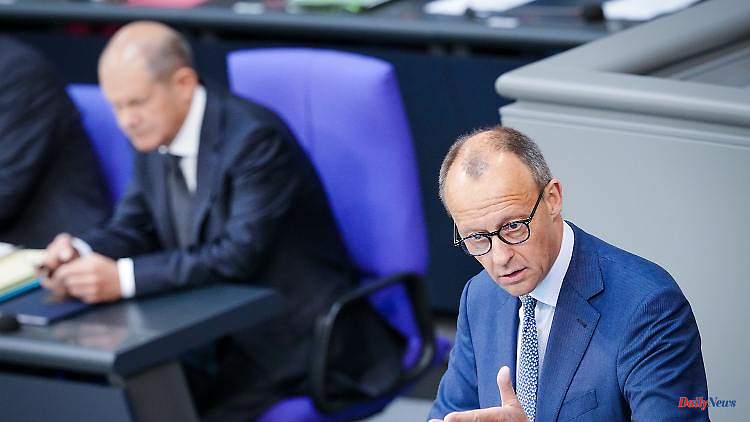At the start of the general debate in the Bundestag, Friedrich Merz did not hold back with his criticism of the federal government's Ukraine course. Chancellor Scholz attacks the decisions in several points, but also receives a sensitive counterattack.
Weapons deliveries, communication or financing of the Bundeswehr special fund: In the general debate in the Bundestag, the leader of the Union parliamentary group, Friedrich Merz, expressed comprehensive criticism of the federal government's Ukraine policy. Merz directed his criticism primarily at Chancellor Olaf Scholz. He is currently talking more than usual, but he still says nothing.
"More than a month after the decision of the Bundestag, Ukraine has not received the promised weapons," Merz emphasized in relation to heavy weapons. Instead, members of the government and the SPD made claims "that are simply wrong". Merz referred to a statement by Defense Minister Christine Lambrecht, who reported on a NATO agreement according to which the alliance countries did not want to supply heavy weapons to Ukraine.
In terms of communication, Merz allegedly criticized the different goals of Ukraine supporters, although they always speak of unity. Scholz only says that Russia should not win this war and that Ukraine must exist, said the Union faction leader. But why doesn't Scholz say that Ukraine must win the war and Russia must at least withdraw beyond the pre-February 24 contact line. "Why don't you say it?" asked Merz. "Is there a second agenda?"
Communication with Ukraine was also a thorn in the side of the CDU man. Merz has a certain understanding that Scholz does not want to go to Ukraine personally. However, there is still no date for a meeting with the Speaker of the Parliament of Ukraine, Ruslan Stefantschuk, who is currently in Berlin. After all, he holds the second-highest office in Ukraine.
Merz initially praised the Bundeswehr's special fund. "You have fully complied with our wishes," said the opposition leader to the SPD, Greens and FDP. The money will only be used for the Bundeswehr. The armament projects would be laid down in an economic plan. And for the first time, the Bundeswehr will receive a financing law that makes it clear that Germany will also meet its obligations to NATO once the special fund has been exhausted.
According to Merz, however, the financing of the special fund will ultimately result in new debts. The CDU boss wanted a different financing. He brought the reintroduction of the solidarity surcharge into play - and promptly received a counterattack from Chancellor Scholz. He evaluated the Merz proposal as an idea that meant a tax increase for all German citizens. "What a strange idea," said Scholz. The CDU had "led an entire federal election campaign to abolish the solos". Now some people in Germany should pay the solidarity surcharge. That's not a good idea," said Scholz.
Scholz also emphasized that the bad times for the Bundeswehr began with the former Union Defense Minister Karl-Theodor zu Guttenberg, who slashed a lot of money. Merz didn't mention that at all.












